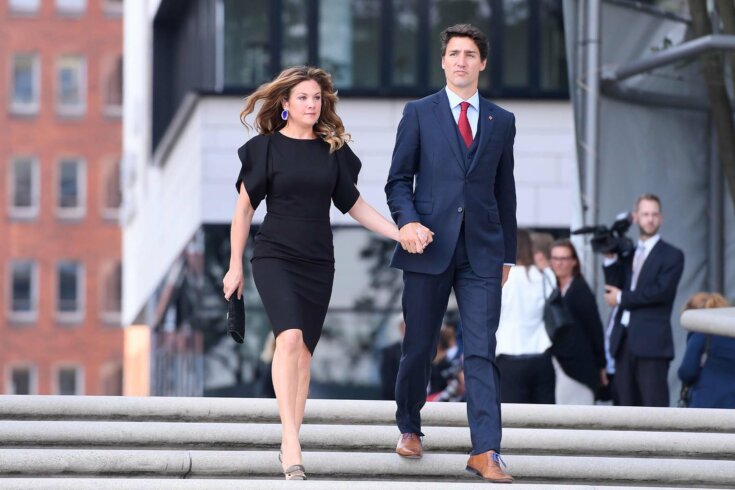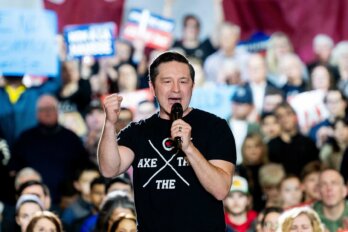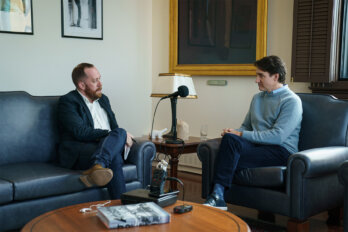In the spring of 2005, Sophie Grégoire wed Justin Trudeau, son of a Canadian prime minister. She arrived at the Montreal church in a 2004 Rolls-Royce Phantom, wearing a custom gown from local atelier Les Noces Couture and clutching a bouquet of white roses. After the Catholic ceremony, 180 guests enjoyed a reception at the now-closed Hotel Le St-James, where they dined on Alberta beef and danced to Brazilian music. The couple’s relationship began in 2003, on a romcom-worthy first date during which Canada’s future prime minister was so lovestruck that he walked into a lamppost. We know all these details because Maclean’s was granted access for a behind-the-scenes feature to cover their big day. The magazine reported that the ceremony was “intimate and personal,” part of “a sweet and appropriately understated fairy-tale wedding.”
But the fairy tale ended on August 2, after eighteen years of marriage, when Grégoire and Trudeau made synchronized Instagram posts revealing they had separated, in a cordial message shared in both official languages. Their separation followed a well-worn celebrity template established in 2014 by exonerated ski resort menace Gwyneth Paltrow and Coldplay frontman Chris Martin, who popularized the term “conscious uncoupling” in an announcement that has been riffed on by public figures ever since. The format is one of scrupulous civility and faultless unity, which emphasizes the couple’s mutual agreement to separate, their shared respect for one another, and their desire for privacy, all summarized briefly in a tasteful text-image posted to the grid.
Responses were immediate. Some were malicious, others thirsty, but they were drowned out by characteristically Canadian politeness. From across the political spectrum, a chorus of voices proclaimed the announcement to be none of anyone’s business. “Trudeau and his policies deserve criticism, not his personal life,” tweeted political columnist Brian Lilley, while journalist David Moscrop agreed: “My take on the Trudeau separation is I don’t care and I don’t see how it affects the public interest in any significant way.” While it’s unquestionable that there is no place or purpose for cruel speculation, Trudeau’s marriage and private life have always been a deliberately cultivated topic of public interest—one that has propelled and shaped his trajectory as a politician.
It makes perfect sense that Trudeau, who intimately understands his own celebrity and the power of social media, would share the news of his separation this way. Trudeau’s Instagram account has been instrumental in his political career and image making—a space for building one of the key pillars of his savvy personal brand: that of friendly approachability and intimate access. All politicians are performers, but Trudeau, with a lifetime of experience in the public eye and an actor’s instincts, is better than most at playing to an audience.
While Trudeau’s father, Pierre, was packaged as a different variety of leading man—a rogue and a playboy—the younger’s charisma was calibrated to twenty-first-century preferences: here was Hot Dad. In 2014, Chatelaine published a profile of Trudeau with the unsubtle headline “Is Justin Trudeau the candidate women have been waiting for?” The focus was not explicitly on his politics but, instead, on what his personal life conveyed about them. Here was “a loving, hands-on parent; a warm, approachable counterpoint to Stephen Harper,” his predecessor who had been mocked in the media for formally shaking hands with his own children at school drop-off. In contrast, the lavish photo spread in Chatelaine showed Trudeau joyfully lofting his baby in the air, piling onto a surprisingly regular-looking couch with his adorable kids, and—pushing the limits of credibility—posing in the pool, all five family members fully clothed and laughing.
Witness the praise heaped upon a man who takes his own children to the playground and you will understand, as Trudeau’s PR team did, that our society loves an engaged, devoted father. It resonated well with his platform: progressive, pro-choice, “woman-friendly.” Where his father was an unabashed champion of coercive assimilation, Trudeau promised reconciliation and justice for Indigenous people. The Conservative opposition campaign tried to brand him as a frivolous, floppy-haired celebrity who was “not ready” to lead, but his visible role as paterfamilias demonstrated commitment, seriousness, maturity. This was communicated explicitly in his campaigning, which subverted the “not ready” messaging to critique the Conservative status quo and was also reinforced through his savvy use of social media.
For politicians who are always trying to downplay their elite credentials and convince the public of their relatability and authenticity, social media can be a tremendous asset. Instagram is a highly mediated space that offers the illusion of direct access and genuine, unscripted interaction. As cultural critic and writer Anne Helen Petersen pointed out in her Substack publication, Culture Study, “The conversation [on Instagram] is easier to both control and ignore; of all the social networks, it most closely resembles the fawning broadcast style of the fan magazine.” And Trudeau, born into the spotlight, has a masterful ability to control a conversation.
A 2016 Globe and Mail article about Trudeau’s dynamic with his photographer, Adam Scotti, called him “the first prime minister of the Instagram age” and described the process of “meticulously selecting” images for his social media accounts. “This Prime Minister’s use of photography transcends his looks and comfort in the spotlight,” wrote journalist Eric Andrew-Gee. Trudeau was keenly aware of the messages conveyed by his facial expressions and carefully chosen clothing. Even off script, he understands how to harness the power of social media to reinforce his political image. In April, a clip of his interaction with a People’s Party of Canada supporter at a University of Manitoba event went viral after Trudeau confidently parried the young man’s anti-abortion arguments, getting the last word in before moving on with a smile. This is not to say that his actions are insincere, only that he always knows how they’ll play on camera—as he did in 2014, when he helped to carry a man in a wheelchair down a set of stairs at a Montreal metro station in an unscripted act of thoughtfulness and brawniness that quickly went viral.
The problem, after eight years, is that while Trudeau’s personal performance has remained flawless, his politics and promises have not lived up to it. He did not get rid of the first-past-the-post system of elections, or make government more transparent and accessible, or live up to his promises on reconciliation. During his tenure, the national crises of health care, housing, and climate change have worsened. And while he is still garnering sizable public approval compared to previous prime ministers, including his father, his support has slipped, according to data from Angus Reid. No matter how carefully chosen, images can do only so much to compensate for actions—and inactions. It’s hard now to picture Trudeau ambling shirtless and carefree into a candid photo, as he did on two separate occasions in a single week of 2016; times and expectations have changed as Canada’s economic and social struggles have grown more serious, and Trudeau’s image as a leader is evolving with them. A country in crisis does not want to see its prime minister flexing his abs on a Tofino surf trip or goofing around in the family pool.
With the separation post, Trudeau is publicly entering a new chapter in his personal life, which, as he has built it, is also his political life. (Grégoire is entering a new chapter as well, with a self-help book about “self-knowledge, acceptance, and empowerment,” scheduled for release next spring.) Inevitably, it will be a chapter no less visible, no less curated, no less scripted than it was before. The separation announcement may be many things: sad, sincere, personal. But it’s not uncalculated, nor is it meaningless. No Canadian prime minister has ever won four consecutive elections, as Trudeau hopes to do in the next election, and he’ll almost certainly be drawing on his personal life to bolster his political image once again. His brand is evolving, and whatever the new role of Divorcé Trudeau may look like, one thing is certain: he’s still aware of his audience.






